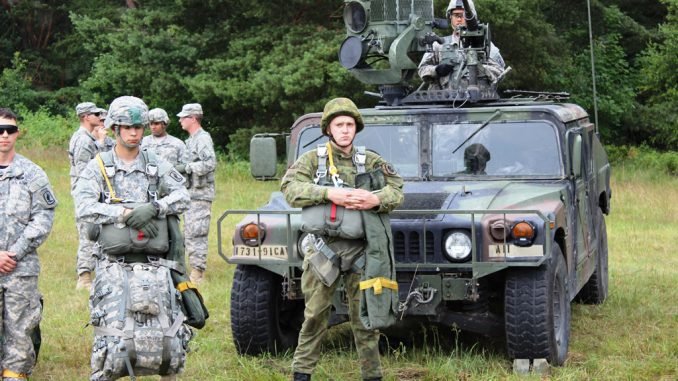
As Ukraine struggles against Russia, there are more and more questions in Lithuania about universal conscription: could universal conscription be introduced in Lithuania? When could this be done? According to National Security and the Armed Forces representatives, it is imperative to ensure highly trained armed forces and army for Lithuania not to be a weak link in the NATO structure. This, they argue, could not be guaranteed by universal conscription and should not be introduced soon, Andresa Repšytė writes in tv3.lt
“Universal conscription ensures that we have an adequate number of active reserve soldiers. We need to calculate what we have in terms of a regular army, what we have in terms of volunteers, and what is the capacity of the state to maintain it. We need to talk about the number of members of the compulsory military in Lithuania,” he said on Wednesday at the discussion. “How is the war in Ukraine changing Lithuania’s security architecture?” Valdemaras Rupšys, Commander of the Lithuanian Armed Forces, said at the General Jonas Žemaitis Lithuanian Military Academy.
He was joined by Deputy Minister of National Defence Žilvinas Tomkus. He said that the main principle of universal conscription is the relationship between citizens and the state.
“We want to strengthen that relationship. Yes, we are talking about strengthening the defence capability, the development of the Lithuanian Armed Forces, and personnel involvement. Still, we cannot lose our (the army’s) influence with the general conscription – we need to keep the balance at all times”, he said.
The Commander of the Lithuanian Armed Forces also agreed on the importance of the link between the army and society. The best example of this, he said, is the Ukrainian society fighting against Russian aggression.
“Regardless of gender and age, the population is ready to take up arms and defend their country. This is good, but on the one hand, it is also fear, focus, and euphoria – one day it will all go away, and we will start to look at it soberly”.
Even if a law on universal conscription is adopted in the future, the decisions would be taken gradually – the state would need to prepare, the Deputy Minister said.
“Then there won’t be the questions that arise now: what will be done [in the event of a disaster], will weapons be given? We are saying that defence must be organised. The more members of society are involved and understand the principles of armed defence organisation. The fewer questions will arise if it is necessary to contribute to the state’s defence with weapons,” the Vice-Minister said.
However, the Lithuanian Chief of Defence criticised Ukraine’s decision to issue weapons to civilians in the first days of the war.
“I will be very unpopular talking about this, but this is grasping at straws. Indeed, there was time, and they could have done it (after the annexation of Crimea – author’s note) to prevent those who are not prepared from taking those weapons into their hands.
We have to be very sober about not giving weapons to people because it is both dangerous and a crime for our small nation,” he said.
Other factors also play a role for universal conscription in Lithuania
In order to legalise universal conscription and to ensure that citizens are trained to a high standard, Rupšys said, more funding must be allocated to maintain the Lithuanian army. It is also necessary to have adequate infrastructure, weapons, instructors and commanders.
“We have to make sure that this does not deplete our resources. 2% or 2.52% [of a country’s Gross Domestic Product for defence spending] is not much. In Germany, for example, hundreds of billions of euros are spent [on the army], while here it is a billion and a half, even though you buy equipment and ammunition not with a percentage but with an absolute amount that you get in euros. With a billion and a half, we can buy as much as we can buy. The same money is needed to maintain the staff,” Rupšys said.
Kasčiūnas, Chairman of the Committee on National Security and Defence, said that he only supports the idea of universal conscription because it reflects geopolitical realities and the principle of universal defence.
“But I fully agree that there needs to be significant investment in infrastructure. Even if such a decision is taken, it is taken within a certain period of time. There has to be a national agreement.
It must not be that the next government that comes in at the 2024 elections cancels. There may be a compromise to call for more, without introducing a de facto general call, but a de facto general call,” Kasčiūnas said.
The news portal tv3.lt reminds us that Russian President Vladimir Putin has declared war against Ukraine. Russian President Vladimir Putin announced a military operation in Ukraine in the early hours of 24 February to help its separatists and to “de-militarise and de-Nazify” its pro-Western neighbour. Martial law has been declared in Ukraine.


Be the first to comment